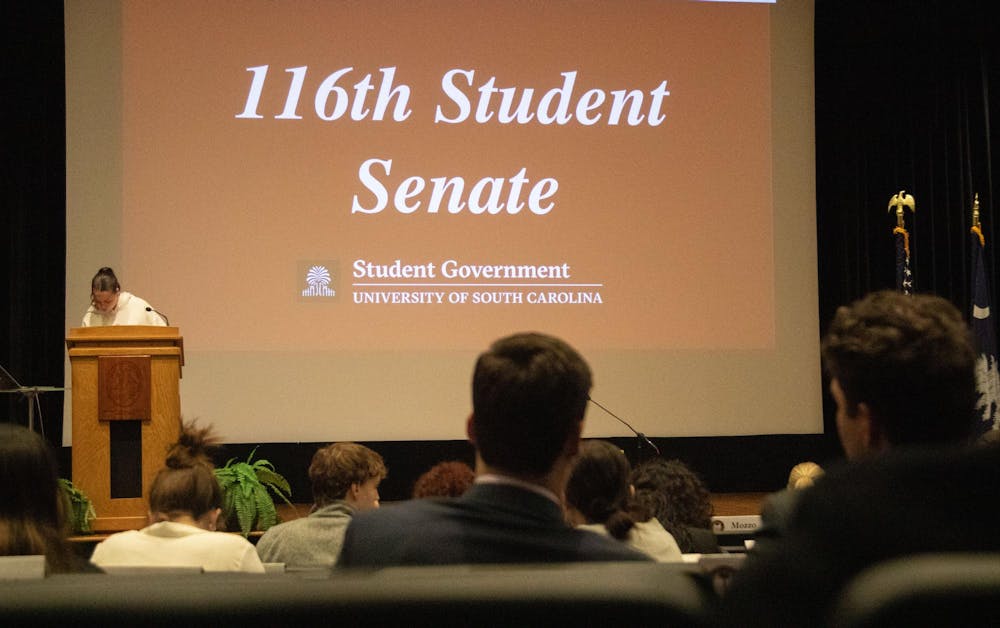USC's student senate passed four pieces of legislation at its weekly meeting on Wednesday, including proposals to increase safety measures on campus and promoting community among commuter students.
The senate adopted a piece of legislation, introduced by Senator Zoe Hopkins, recommending increased lighting on the Horseshoe.
According to the recommendation, the Health and Safety Committee received concerns from students about inadequate lighting on the Horseshoe, which was seen as a safety hazard. After surveying the area, Senators Hopkins, Cumby and Wenzel found that the entire center of the Horseshoe remains unlit.
The recommendation urges the university to invest in additional lighting for the area and suggests installing small lights along the walkways to improve visibility while minimizing potential tripping hazards. The proposal says that better lighting would not only enhance student safety for those walking across campus late at night but allow students to enjoy the space later into the evening.
Hopkins said that the lights would probably not be tall so that people can still play Frisbee.
"(Lights would focus) more on the center- because that's where most of the darkness accumulates, but honestly anything we can get is a win," Hopkins said.
Another piece of adopted legislation, introduced by the Chairwoman of the Inclusion and Equity Committee Laukhika Kasetty, was to implement a University 101 section for commuting students.
According to the recommendation, University 101 plays a vital role in helping first-year and transfer students transition successfully to campus, both academically and socially. Currently, University 101 offers sections tailored to specific student groups, such as honors students, Preston Residential College students and Capstone students.
However, first-year commuter students often face unique challenges in adjusting to campus life since their experiences differ from those living on campus. The proposal recommends adding a University 101 section specifically for first-year commuter students and encouraging academic advisors to recommend this option to them.
"The purpose of adding a commuter University 101 section is that it would essentially provide a space for first-year commuters to interact (with each other) and get an institutionalized way to make their college transition easier and set them up for success as a commuter," Kasetty said. "Being a commuter as a freshman can be challenging, and there might be a certain sense of disconnect from the rest of campus.
Kasetty is the founder and president of the Carolina Commuters Club, which was founded in spring 2023 as a student organization for commuter students. Through leading the organization, she realized that a University 101 class would be beneficial to them in terms of being able to learn how to navigate the university from a commuter lens.
"It is also very important for commuters to have a commuter community as well," Kasetty said. "I think that as a freshman, if I had a class where I could learn about the university with other commuters, I would have benefited a lot more."
Another piece of adopted legislation , introduced by the Chairwoman of the Judiciary Committee Kiki D'Apolito, was a bill to remove the Internal Monetary Fund (IMF).
D'Apolito said that the internal budget was initially structured with line items for specific initiatives, and the Internal Monetary Fund (IMF) was used to cover expenses that aligned with those categories. As Student Government evolved, the budgeting model shifted to a lump sum allocation, eliminating the pre-planning of initiatives. IMF began to serve as a fund for emergency situations, whereas those expenses were previously planned in advance.
"Because the money is requested throughout the terms for events by Student Government, the IMF decreased from $2,000 to $500 this year – and that money still wasn't used," D'Apolito said. "The money will get re-allocated to the budget, meaning that we're not losing the money from this bill – and this will take effect next year."
Speaker of the Student Senate Maura Hamilton said as Student Government grew, people realized it was better to have a giant initiative bucket instead of tiny allocations.
Hamilton said that originally, during the time of tiny allocations, the purpose of the Internal Monetary Fund was to set money aside in case an initiative popped up in the middle of the year that Student Government decided to do.
"A good example of that would have been the Hurricane Helene efforts that we did-but (the IMF is) kind of not necessary anymore. This year there's only $500 in the IMF. It doesn't really serve its function," Hamilton said.
The other piece of adopted legislation, introduced by the Chairman of the Finance Committee William Wenzel, was a bill to allow the Finance Committee to distribute funds to various student organizations.
According to Wenzel, the Finance Committee reviewed $21,576.19 and approved $21,560.92.
The Women in Business Council received the largest allocation at $6,597, followed by the Chabad Jewish Student Organization with $5,904.84. Cockappella was granted $3,005.78, while Gamecock Robotics received $2,994.51. The National Society of Minorities in Hospitality was awarded $2,168, and the Catholic Campus Ministry received $500. Alliance for Women in STEM received $147.90 and Women in Computing received $242.89.
The 116th student senate has four senate sessions left. The next meeting will be held on Feb. 19 at 5:30 p.m. in the Russell House Theater. All students are welcome to attend these meetings.

